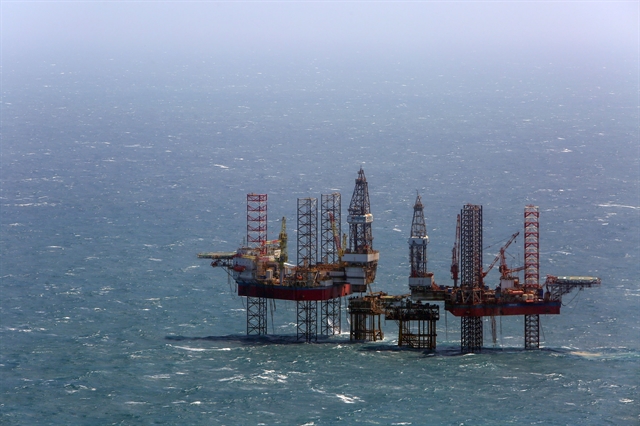 Economy
Economy


|
| An oil rig at PetroVietnam's White Lion (Bạch Hổ) oilfield. The Vietnam Oil and Gas Group contributes 20 per cent to the country's GDP. — VNA/VNS Photo Huy Hùng |
HÀ NỘI — The Vietnam Oil and Gas Group (PVN) needs to set up a national energy reserve centre to deal with emergencies when there are interruptions in the supply source, said Deputy General Director of Vietnam Petroleum Institute Nguyễn Hồng Minh.
Speaking at the seminar entitled ‘Ensuring National Energy – The Role of the Petroleum Industry’ held in Hà Nội on Thursday, Minh said the establishment of the energy reserve centre would go along with the country’s energy savings solutions.
“In addition, the promotion of exploring energy resources, including oil and gas, will be a regular solution to enhance the exploration capacity of primary resources and reduce the dependence on the other suppliers,” Minh said.
In recent years, Minh said PVN has signed very few petroleum contracts, reducing drilling activities, with investment capital at only 25 per cent compared to previous years.
“While PVN's resources are still limited, the call for foreign investment in this risky sector is also greatly entangled by policies, which are not appropriate in the current context,” Minh said.
Chairman of PVN Trần Sỹ Thanh said the oil and gas industry had made an important contribution of oil, gas and power to ensuring national energy security as well as the country’s GDP growth, creating many jobs.
Thanh said for many years, the petroleum industry had contributed to GDP growth with a proportion of over 20 per cent, accounting for over 30 per cent of the total State budget revenue and about 20 per cent of the country's total export value.
“Even with many changes around the world and the domestic economy, with many industries and fields of domestic production declining, the oil and gas industry maintains growth and ensures national energy security, contributing to macroeconomic stability, curbing inflation and stabilising the market,” Thanh said.
He said the goals for the oil and gas industry were set in the Party’s Resolution 41-NQ/TU on strategic direction and development of the oil and gas industry until 2025 on July 23, 2015. However, after nearly four years of implementation, it lacks specific solutions and policies to turn these goals into reality.
Thanh said the biggest challenge was that PVN had not yet approved the financial management regulation of its parent company, so its activities were very risky.
In addition, Thanh said the current financial mechanism for oil and gas drilling had many overlaps, leading to difficulties in increasing reserves.
“This is the biggest concern for ensuring the country's energy security.”
Speaking of the difficulties and challenges that the industry is facing, former Minister of Trade and Industry Trương Đình Tuyển said that energy security had a great impact on food and financial security.
Tuyển said the Law on Petroleum should be amended soon to suit the new context, creating motivation for an important industry.
At the seminar, participants also focused on clarifying the requirements of ensuring national energy security on the basis of studying opportunities and challenges of the oil and gas industry in Việt Nam.
They also recommended solutions to ensure national energy security in the future, especially in the context of integration, globalisation and the trend of developing renewable energy.
The workshop also reviewed the development of Việt Nam’s oil and gas industry after 60 years of implementing Hồ Chi Minh's testament (July 23, 1959 – July 23, 2019), which clarifies the role of the oil and gas industry in ensuring national energy security. — VNS




